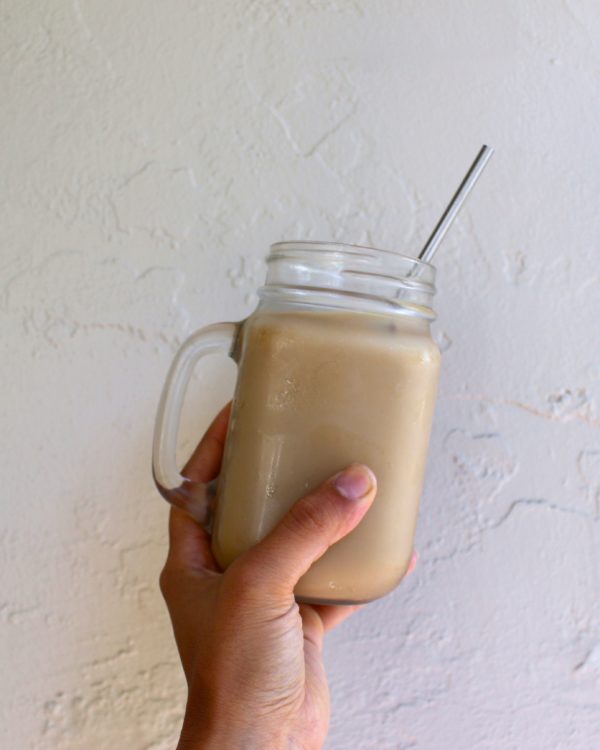This post may contain affiliate links. Please see our disclosure policy.

It’s estimated that 54% of Americans over the age of 18 drink coffee daily, and they drink an average of 3 cups a day. It’s an addicting habit (and expensive, if you don’t brew at home), so I get why many are curious if their daily cup of joe is doing their body any good… or harm.
First, the Benefits…
I hear various research findings every week on how coffee is so great for our health in so many ways, and yes, many of them can be true. Here are some of the potential benefits that we know about coffee:
1. Full of antioxidants. Antioxidants protect us from aging, diseases, and cancer by disabling free radicals in our body so coffee can be quite beneficial for our health in this way. A study ranked the highest antioxidant-rich foods, and coffee came in within top 50, after various spices and berries. Antioxidants also reduce inflammation in the body, which is an underlying cause of many chronic conditions.
2. Improves our mental health. Coffee can act as a mild antidepressant by producing serotonin, dopamine and adrenaline. One study found that drinking coffee daily actually seemed to reduce the risk of suicide by about 50 percent. The caffeine in coffee also gives our brain a jolt, helping us become more productive and acute in our thinking (Yes, I’m enjoying a cup of coffee while I write this). There are also claims that coffee may impede the onset of Alzheimer’s disease and dementia.
3. Aids blood sugar control and may promote weight loss. Increasing coffee consumption has been associated with lowering the risk of type 2 diabetes. Also, in a study done on mice, coffee intake improved glucose tolerance and reduced body fat. This makes sense because caffeine is a stimulant, increasing our adrenaline level and metabolism to a certain degree.
4. Helps us be better athletes. The caffeine in coffee causes the body to break down fat cells into our bloodstreams, which we can then use as fuel. Also, caffeine increases our stress hormones, initiating a “fight or flight” response, gearing us up for intense physical exertion. One study showed that caffeine ingestion improved exercise perform by over 11%!
So… What’s Wrong with Coffee?
Don’t you wish I would just talk about all the good things coffee does for us, and end the post there? Me too, but sorry. As heavenly and beneficial as that sip of coffee can be in the morning, it does pose some potential problems that you should know so you can make the best decision for yourself about whether it’s right for you.
1. Pesticides and work conditions. Did you know coffee beans are one of the most chemically treated crops in the world? As if that wasn’t enough, many conventional coffee farm workers earn below minimum wages working in harsh conditions constantly being exposed to cancer-causing pesticides. Child labor is also prevalent in coffee cultivation. Always look for Fair Trade and organic when purchasing your next bag of beans to not only avoid ingesting harmful chemicals in your coffee, but also to avoid supporting horrible conditions of coffee workers worldwide.
2. Sleep loss. If you have trouble getting 7-9 hours of sleep, you may need to cut back on your caffeine intake. Yes, that 1 cup you drink in the morning can very well affect your sleep 15 hours later. After I started having sleep issues I cut back on my coffee, and it improved my sleep drastically. Sleep is extremely important for our body and mind to function optimally, and even for weight loss. Especially during a period that you are stressed out, it’s even more important to reduce your caffeine intake.
3. Stress and hormonal problems. For those suffering from chronic stress, and many people do in the modern world, coffee can spike up the stress hormone cortisol and exacerbates the already inflammatory condition your body is in. Chronic high levels of cortisol lead to various problems in the body affecting the thyroid, sex, and adrenal hormones. It even leads to weight gain and various diseases related to stress. When I feel especially stressed out, I cut out coffee for a few days so I don’t have to deal with the consequences of putting my body in overdrive.
4. Hard on the liver. Your liver is one of the most hard working organs in the body and has numerous functions. One of its job is to metabolize caffeine. If you feel especially jittery and wired after drinking a cup a coffee, it may mean that your liver may not be detoxing caffeine optimally. You may be a “slow metabolizer,” which is a genetic condition in which you metabolize caffeine slowly, and it means that caffeine stays in your bloodstream longer when it should be getting ready to be excreted out of your system. This can lead to adrenal fatigue and cardiovascular problems, and I advise that you cut out coffee completely, or limit it to 1 cup a day.
5. Leads to mineral deficiency. Caffeine blocks the absorption of certain vitamins and minerals by inhibiting their receptors and promoting excretion of certain water-soluble nutrients. Vitamin D, calcium, iron, zinc, and B vitamins are especially affected. Keep in mind that chronic stress also depletes minerals in the body so pouring coffee into an already stressed out body can lead to a damaging outcome.
6. Dehydration. Coffee is a diuretic and it increases the blood flow through the kidneys, promoting the loss of fluid from the body. While the effect of this alone isn’t strong enough to cause dehydration directly, so many people aren’t drinking enough water already so it can exacerbate the situation. It especially concerns me because I find that clients quench their thirst with caffeinated drinks instead of water, further contributing to the problem. If you do drink coffee, I advise you to fit in 1.5x that amount in water in addition to your regular daily intake.
7. Digestive distress. If you have compromised digestion, coffee can worsen your condition. Many digestive symptoms stem from low stomach acid, leaky gut, and dysbiosis (when good gut bacteria is diminished and overtaken by bad bacteria). While coffee is acidic, it has an opposite effect on the stomach and raises the pH of the stomach, further contributing to problems like diarrhea, bloating, acid reflux, gas, and lowered immunity. Its role in elevating stress levels can also worsen digestive issues.
8. Addiction problem. There’s a reason there are ton of memes and funny quotes about how we can never give up coffee and how coffee is our best friend. So many of us rely on it heavily to wake up in the morning and get going. It doesn’t matter if it’s drugs, alcohol, sugar, or coffee, addictive behavior is not healthy and you shouldn’t feel like you NEED it to feel “normal.” To find out if you are addicted, try to go without it for a few days and see how you handle it. I even suggest making it a habit to cycle in and out your caffeine intake week by week or even monthly to keep your addiction in check. The first time I tried to give up coffee cold turkey, I actually went through detox symptoms had unpleasant digestive reactions for several days until my body normalized again. After realizing how much my body was addicted, I do a week of no caffeine every month now.
So is coffee good for you?
And the answer that EVERYONE loves…: It depends.
Coffee can be a healthy addition to your diet if you are feeling good, you buy organic and Fair Trade beans, and don’t go overboard with your intake (keep it to 2 cups a day max). However, for anyone suffering from stress, sleep issues, and digestive problems, it may be a necessary healing step for your body to let go of caffeine for a period of time. This doesn’t have to be permanent, but always be mindful of the way your body feels so you can adjust your intake accordingly.
What about decaf?
If you are sensitive to caffeine, decaf coffee can be a great option. Unfortunately, many standard decaf beans contain carcinogens and known toxic chemicals. This is because one of the main decaffeination processes is to rinse the beans with methylene chloride or ethyl acetate to reduce the caffeine. If you decide to purchase decaf coffee, make sure the label states that it’s been decaffeinated by the “Swiss Water process” or the “CO2 process.” These two are the safest and cleanest processes used to take the caffeine out of the coffee beans.
Also keep in mind that decaf coffee isn’t 100% caffeine-free. There is still a small dose left in there, and if you are especially sensitive, that little amount can still affect you and be mindful of your intake.
Any more questions about coffee? Leave a comment below or contact me! I’m happy to help you figure out your coffee intake, and some healthy substitutions you can make to let go of your caffeine habit!










Yes, I think that also depends on the person as well. I seriously love drinking coffee and the ritual so much and have tried so many different types (smooth, low caf, etc) so I can enjoy it. However, my cortisol rises for all those options and I have such negative side effects. It’s important to look at bioindividuality, as well specific person’s adrenal health.
Haha, I know. Coffee really is the best. Caffeine does affect me for hours so if I’m really craving coffee in the afternoon, I make myself a high quality Swiss water process decaf, but yeah… NOT THE SAME. 🙂